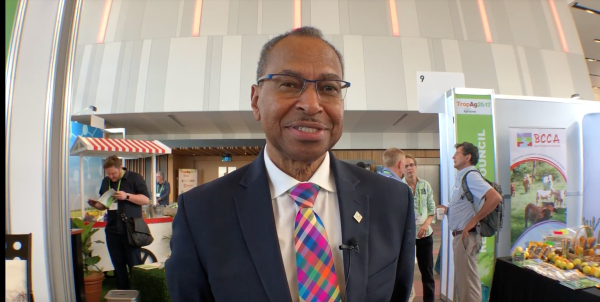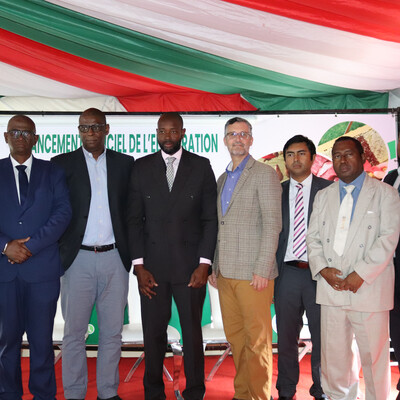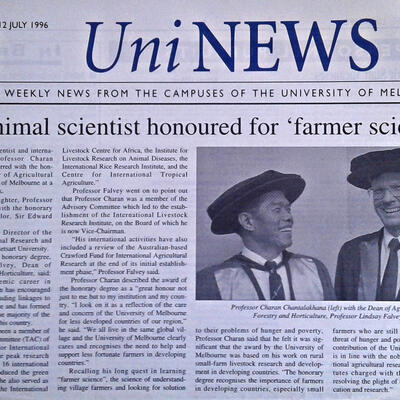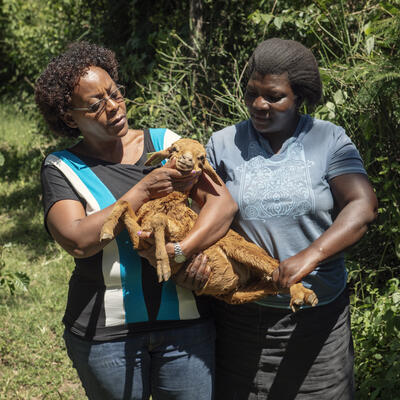
Jimmy Smith speaks in Australia on the pursuit of a ‘low-emissions cow’ and other livestock matters
ILRI director general Jimmy Smith at #TropAg2017.
Visiting Brisbane in November for the International Tropical Agriculture Conference for 2017, Director General of the International Livestock Research Institute Dr. Jimmy Smith discussed with Devex a range of new and exciting programs his organization is delivering to help create climate and disease resistant livestock for Africa.
‘“In the past, livestock research has not had the benefit of the crop world where generation intervals are short,” Smith explained. “In cattle, the generation intervals are long, so to breed can take years and years. Using genomics now, we can find genes that improve livestock and move them around quickly. This allows us to make genetic improvements at a much faster rate than we could have with traditional breeding.”
‘The new programs use genomics to look for disease and heat resistance in livestock and understand the adaptive traits.
“It is creating a bit of excitement,” Smith said. “We can get productivity traits up, disease resistance up and enhance adaptive traits to climate change. That’s the new science.”
‘With research progressing rapidly, Smith believes 2018 will see ILRI deliver a number of findings and outcomes that will help better understand livestock genetics, diagnose and treat diseases, and develop healthier and more productive livestock in Africa.
ILRI research programs are focused on large crossbred livestock in the developing world — particularly Africa.
‘“We are looking to find elite animals which we can identify through their ability to adapt and produce well in the developing world,” Smith said. “And then we want to be able to move these traits into the wider, larger population and use these wider populations to get them in the hands of farmers.”
Advancing genomic technology will enable the faster dispersion of “good” genetic traits.
‘To create animals that can better adapt to climate change, for instance, Smith said ILRI is “trying to understand how heat tolerant traits are conferred genetically, identify these genes and concentrate them within populations.”
‘The programs include similar scientific and genetic approaches to building disease resistance in livestock including the targeting of a big killer of livestock in Africa—east coast fever.
‘While there is a vaccine for east coast fever, the price puts it out of reach for many farmers. “It’s the malaria of cattle,” Smith said. “Once an animal gets it, they are likely to die.”. . .
‘Researchers are working to identify cows that naturally produce less methane, hoping to spread these genes throughout the global livestock population.
‘Improved productivity is equally important in reducing the carbon footprint of livestock, particularly cattle, as well as feeding growing populations. “One of the biggest thing[s] you can do in the developing world is increase the productivity of the animals,” Smith said. “If the animals that gives two litres of milk today can give ten in a few years’ time, you can see how you can cut emissions.”. . .
“If you raise productivity you can meet the demand with fewer animals.”
‘And Smith believes the research, science, data and technology are now all combining to produce livestock that can best tackle current and emerging challenges in developing countries.’
Read the whole article by Lisa Cornish in Devex: How scientists and farmers creating climate and disease resistant livestock for Africa, 6 Dec 2017.
Read another news clipping about this by Shan Goodwin: Global livestock game at tipping point, North Queensland Register, 20 Dec 2017.
Listen to Jimmy Smith live from the Australia meeting—International Tropical Agriculture Conference for 2017 (#TropAg2017)—held in Brisbane 20–22 Nov 2017.



















